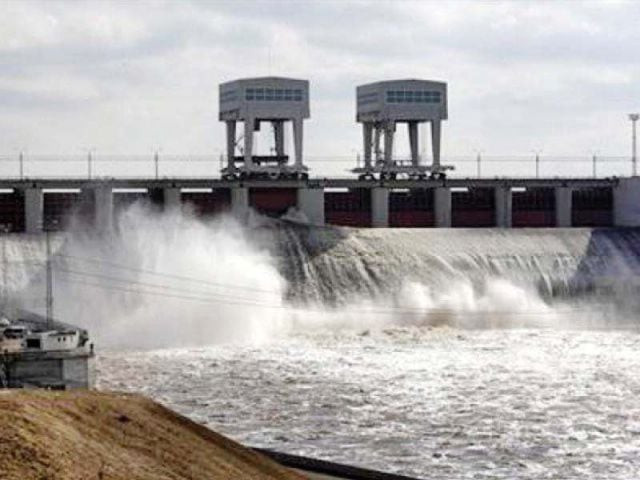Poor rating mars $3.5b debt plan
Govt needs funds for Basha dam, once again wants to include it in CPEC

As Pakistan’s junk credit rating becomes a hurdle in the way of acquiring $3.5 billion in debt for the Diamer Bhasha dam project, the government has decided to simultaneously try to sell its stake in another power project and convince Beijing to make the scheme part of the China-Pakistan Economic Corridor (CPEC).
The Water and Power Development Authority (Wapda) – the sponsor of the Diamer Basha dam project – has requested Islamabad to pitch the project as a “big-ticket item” to Beijing during next week’s visit of Prime Minister Shehbaz Sharif, according to government sources.
The authority told the government that its options were limited due to no response from various multilateral creditors.
Among the available options are to sell a stake in the 1,450-megawatt Ghazi Barotha hydropower project to Kuwait and once again persuade Beijing to make the Diamer Basha project part of CPEC, according to the recommendation made by Wapda to the federal government.
During last week’s meeting of the CPEC Joint Cooperation Committee (JCC), Pakistan requested China to consider the Diamer Basha project for inclusion in CPEC. PM Shehbaz may now request the Chinese government to sign a framework agreement to review the possibility of including the project in CPEC, they added.
The government requires $4 billion for the power generation component of the project but it has so far been able to borrow only $500 million through the sale of Eurobond. It is in search of $3.5 billion to construct the 4,500MW powerhouse of the project.
Wapda has informed the federal government that its capacity to borrow from the international capital and financial markets is constrained owing to the low sovereign credit rating and Pakistan’s economic vulnerabilities.
International credit rating agencies have assigned junk rating to Pakistan, describing the country’s debt as highly risky. This has now become the biggest stumbling block in the way of acquiring new foreign commercial loans and floating sovereign bonds.
The United States has offered to provide debt for the Reko Diq mining project, subject to the condition that Pakistan grants US Exim Bank the status of a preferred creditor.
Pakistan had hoped that the last standby arrangement of the International Monetary Fund (IMF) would help it win improved ratings but it did not happen due to the high external financing requirement.
In November last year, Pakistan signed a memorandum of understanding (MoU) with Kuwait for selling its equity in the Ghazi Barotha hydropower project. The understanding had been reached between Pakistan and the Kuwait Investment Authority for undertaking the process through the latter’s subsidiary Enertech.
Sources said that due to the limited financing options, it had been decided to fast-track the hiring of a financial adviser to sell the equity stake to Kuwait. After the hiring, the government will expedite the process to sell its shares to Kuwait.
Following lukewarm response from the Asian Development Bank and the World Bank, Pakistan had begun construction of the dam, with a storage capacity of 6.4 million acre feet of water, from its own resources. It hoped that it would be able to raise commercial financing for the 4,500MW power house.
The federal government approved the generation component of the project at a cost of Rs1.42 trillion two years ago.
It was struggling to find an anchor financier for the project and tried to convince the Saudi Fund for Development, Islamic Development Bank, Asian Development Bank and Asian Infrastructure Investment Bank to fund the project but so far no breakthrough could be achieved, Wapda informed the federal government.
The government has also attempted to enter into an investment-debt arrangement with Saudi Arabia. Last month, Pakistan offered the Diamer Basha project to Saudi Arabia for equity partnership, seeking $1.2 billion in equity investment and $2.3 billion in debt for 10 years.
Pakistani authorities were hopeful that Saudi Arabia would pick the project as part of its $5 billion investment plan. However, the government has not yet formally received any response from the Saudi authorities, said a senior government official.
The Diamer Basha project is being constructed with a ratio of 30% equity and 70% debt. The dam will generate around 18 billion units of electricity annually.
Pakistan has described it as a critical project for restoring the energy sector’s viability and reducing the carbon footprint.
PM Shehbaz has instructed the Ministry of Planning to make Diamer Basha dam part of CPEC. This is the second time in seven years when Pakistan has decided to include the project in CPEC.
Published in The Express Tribune, May 31st, 2024.
Like Business on Facebook, follow @TribuneBiz on Twitter to stay informed and join in the conversation.



















COMMENTS
Comments are moderated and generally will be posted if they are on-topic and not abusive.
For more information, please see our Comments FAQ